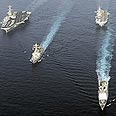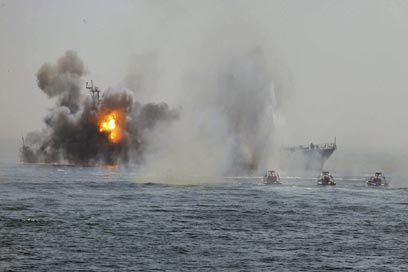
Fateful battle in the Gulf
Ynet special: Israeli-Jewish angle in fateful Gulf emirate's battle of succession
The emirate's location makes it very important in the context of the economic sanctions that the US attempts to impose against Iran. Yet at the same time, Ras al-Khaimah features a fierce battle of succession between the two sons of the old Emir, Saqr, who was crowned a few days after the State of Israel's establishment in 1948. In recent weeks, the emir has been on his deathbed at a government hospital, under heavy military guard.

Iranian war games in Gulf (Photo: AP)
The wise and moderate emir is 92, but has not been functioning for a few years now, while constantly shifting from dementia to unconsciousness. So who will succeed him, his 70-year-old son Khalid, or his 54-year-old son Saud? This question is seemingly of no interest to anyone outside the emirate, yet the emir's fate and especially the identity of his successor is of crucial importance.
Talking to Israel's embassy
Khalid makes sure to travel all the way to the mountainous border with Oman when he's in the country; there, he can make phone calls using Oma's cellular network (when he is in his own country, he is convinced that British intelligence officials are eavesdropping.)So who does he speak to, with the exception of public relations firms and important US lobbyists? With Israel's embassy in London, which maintains regular contact with him and receives various updates from him as well as requests for assistance in his battle to take over the emirate.
Sheikh Khalid bin Saqr al-Qasimi is the eldest son of the emir, who already transferred significant authority to his son back in the 1970s. However, in 2003, surprisingly and with almost no media coverage, the emir stripped his eldest son from all his powers and made his other son, Sheikh Saud, heir to the throne and ruler in practice. The UAE then sent military reinforcements to prevent an uprising by Khalid's loyalists. The latter was forced to leave the emirate and settled in London, where he continues to reside with generous royal family funding.
Khalid's London exile
Intelligence sources who looked into the matter said Khalid has turned into a source of embarrassment for the UAE. While the war in Iraq was ongoing, with coalition forces in UAE bases, the sheikh and his wife led an anti-war march in the streets of Ras al-Khaimah. Some witnesses said that US flags were burned during the rally right before the eyes of the sheikh and his wife, who did not prevent the protest.Behind the scenes, the royal families of Dubai and Abu-Dhabi are the ones pulling the strings, and any shift in power could not have been carried out without their advance approval. Their policy is determined by two parameters: Security stability, provided by the US, and continuing economic prosperity. Khalid was threatening this stability with his actions.
However, in 2008, after residing in London for five years in relative quiet, the dismissed brother decided the time has come to retake power in Ras al-Khaimah. He hired the services of an American PR firm and paid it about $4 million in two years as part of a long-term agreement meant to create "positive leadership image" for him."
Jason Kinney of PR firm California Strategies confirmed that his company has provided Sheikh Khalid with various public relations services.
"This has been an open and transparent process from the beginning," Kinney said. "We have taken the strategies and tactics we developed at the White House and on various US presidential and statewide campaigns and applied them in support of His Highness Sheikh Khalid."
Meeting with Clinton
This campaign has two main objectives: Firstly, smearing the current ruler, Sheikh Saud; secondly, positioning Sheikh Khalid as a proper alternative. Campaign leaders believe that should these messages be received by Washington, the US will exert pressure on Dubai and Abu-Dhabi to bring Sheikh Khalid back home.Yet most interestingly, Prince Khalid's campaign focuses on branding him in Washington and in Israel. During the US presidential raise, a meeting was organized between him and Hillary Clinton, then the Democratic Party's leadership candidate, as well as her advisor on security affairs, Wesley Clark. The sheikh was photographed shaking hands with Clinton, and also met one-on-one with General Clark, who he said provided him with priceless advice on fighting terror in Ras al-Khaimah.
At the same time, Khalid's campaign team made an effort to plant a story in there press whereby Ras al-Khaimah, under the rule of his brother Prince Saud, is an unsafe place, with al-Qaeda and Iranian intelligence cells active in the emirate. Back in July 2009, the sheikh's PR people met with several journalists and tried to convince them that the failed attack on the world's tallest tower, in Dubai, was carried out by al-Qaeda cells who originated in Ras al-Khaimah and operated with Iranian funding and guidance.
Immediately after the publication, one of Shiekh Khalid's lobbyists sent him a copy, ending his letter by saying that "this is the beginning of the end for your brother."
The Jewish connection
Meanwhile, the campaign team had also begun exploring the possibility of cooperating with the American Jewish lobby – a staunch supporter of sanctions against Iran.
In March 2010, at the advice of Israeli Ambassador to London Ron Prosor, members of Sheikh Khalid's team traveled to Washington to meet with AIPAC officials.
Khalid met with Prosor at a time when the Israeli Embassy in London was being attacked by local politicians and the media over the assassination of senior Hamas figure Mahmoud al-Mabhouh in Dubai.
Khaid presented his claims to Prosor, and his British attorney later wrote the ambassador's secretary that the sheikh "enjoyed the meeting very much."
Since then Khalid and his associates have met with Prosor on several occasions. According to reports, the ambassador is very supportive of the sheikh's objectives.
About two months ago Prince Khalid was notified that his father, the emir, was on his deathbed. The lobbyists sent an urgent email to all team members, calling on them to "step up the pressure." The reason for this is clear – as long as the father was still alive, the brothers could make the "switch" between them. But once he dies, the current ruler, Saud, would be named the new emir.
Physicians believe the emir could pass away in the coming days. Supporters of Khaid and Saud, just like the intelligence agencies and foreign ministries in the US, Europe and Israel, are anxiously awaiting further developments.










